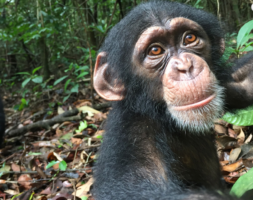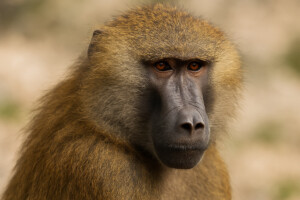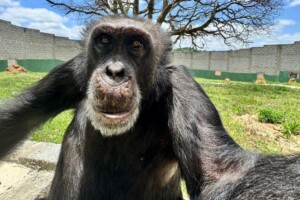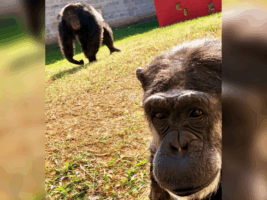Pedro Ynterian’s Conservationist Battle

Brazilian biologist begs for a Law to equal them to humans: they can end up being arrested by stealing a banana, but they will never more be mocked in slavery
MILAN – From the circus to a kind of earth paradise: this is the destiny of the chimpanzees hosted by Pedro Ynterian, Brazilian biologist, president of Great Ape Project,on his family property, where he aims to recover the primates that used to work in circuses physically and psychologically. Ynterian’s story is known all over the world. Reuter has been highlighted the battles of the Brazilian conservationist and did a summary of his latest important conquers.
GUGA IS SAVED FROM THE CIRCUS – Everything began with Guga. He was a baby chimpanzee that Pedro Ynterian saved for the first time from a circus. It was in 1999. He was the first guest on his property in Sorocaba, in a big area of his family, where the biologist began to house the ones from zoos. Frequently animals that were mistreated physically and mentally arrive at the Primates Sanctuary. The chimpanzees arrived disturbed in the name of human entertainment. Humans even blinded them. They arrived at Sorocaba to be taken care of and, mainly, to be loved. A psycologists team recovers them from the damages caused in their minds. In 1994 Great Ape Project was born in United States and in 2000 Ynterian started the work in Brazil. The most recent battle of the conservationist is for the guard of chimpanzee Jimmy, who needs to be taken out of Niterói zoo (Rio de Janeiro), where he lives under nonhuman conditions. “The only difference is that they do not talk”, points Pedro Ynterian. They communicate through gestures, noises and facial expressions. This justifies the need that their rights to life and freedom to be guaranteed, just like with human beings.
BEYOND THE SANCTUARY – The objective of the Brazilian biologist is more ambitious than the work at his shelter at Sorocaba. The conservationist wants to extend the legal rights to chimpanzees, bonobos, gorillas and orangutans. He is sure that a simple animal protection law will not be enough to avoid torture and other serious violations. The thought of Ynterian agrees with the ideas of Peter Singer and Richard Ryder, conservationist who defined, for the first time, the concept “especista” (prejudice for different species), which today is very much used on Animal Rights literature. The concept is used, according Wikipedia “to describe the prejudice practice dictated by the convention of anthropocentrism, which defines that human beings have a superior moral status, therefore can enjoy of stronger rights, compared to other animals.” The final objective is to extend the basic human rights also to primates, and with the rights, the duties. A chimpanzee could be arrested for stealing a banana, but no chimpanzee will be mistreated or mocked by being a slave, which could lead to its extinction.
THE GOVERNMENT OF THE MOST SENSIBLE COUNTRIES – A lot of countries are already advanced about the requirements for the rights of primates. Brazil forbids the use of chimpanzees and other animals in circuses. Spain has been offering total support of Great Ape Project. Great Britain has been guaranteeing to this specie a special status in scientific procedures, protecting them from medical research. New Zealand forbids any kind of use in researches and tests, unless the investigation does not affect the animal welfare. The political proposal of this great project is clear and explicit: to include the non-human anthropoids in an equal community, conceding them moral and legal protection that today only human beings have.

 Español
Español
 Português
Português








